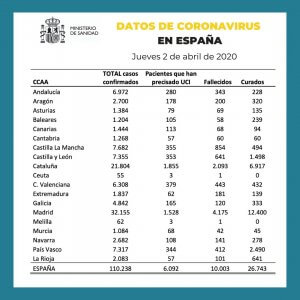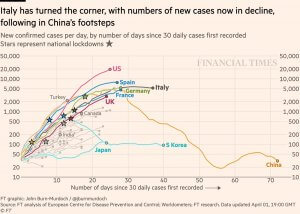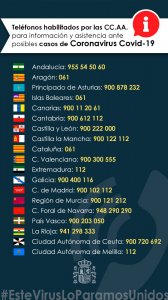Report updated in Spain at 18h on 2 April.
Official figures released by the Spanish Health Ministry at 11.45am on Thursday 2 April confirm 110,238 known cases of Coronavirus (Covid-19) in Spain, 8,102 more than yesterday.
10,003 people have died from the pandemic (up by 950 from yesterday). This is an increase of just over 10%, the same as on Wednesday.
There are now 6,092 people in intensive care. 26,743 people have now made a full recovery, which is 4,096 more than yesterday.

Of the official figures announced, 32,155 confirmed cases are known to be in the Madrid region, and where 4,175 have died (from the total 10,003 across the country).
There are now 21,804 cases in Catalonia (2,093 deaths), 7,317 in the Basque Country (412 deaths), 6,972 in Andalusia (343), 7,682 in Castilla La Mancha (854) and 6,308 in Valencia (443).
Figures for those infected with Coronavirus in other regions are as follows: Aragón 2,700 (200 deaths), Asturias 1,384 (69 deaths), Balearic Islands 1,204 (58), Canary Islands 1,444 (68), Cantabria 1,268 (60), Castilla y León 7,355 (641), Ceuta 55 (1), Extremadura 1,837 (181), Galicia 4,842 (120), Melilla 62 (1), Murcia 1,084 (42), Navarra 2,682 (141) and La Rioja 2,083 (101).

GLOBAL OVERVIEW
As confirmed cases of Coronavirus (Covid-19) continue to rise around the world, the World Health Organization (WHO) has said that the figure will reach one million and the death toll 50,000 during the next few days. More than 46,000 people are currently known to have died worldwide from the pandemic.
The USA, now accounting for almost a quarter of known global infections, registered its 5,000th fatality overnight, according to figures compiled by the Johns Hopkins University. The country reported its highest one-day death toll of 884 people on Wednesday.
US President Donald Trump told a White House press briefing that ‘we’re going to have a couple of weeks, starting pretty much now, but especially a few days from now, that are going to be horrific.’ White House medical experts are forecasting that even if American citizens follow confinement instructions, between 100,000 and 240,000 people could die in the USA from Covid-19.
France registered its highest daily number of deaths from Coronavirus on Wednesday since the pandemic epidemic began, stating that 509 more people had died, bringing the toll to 4,032. There are 24,639 people in hospital with the virus in France, of which 6,017 are in intensive care. France is the 4th country to pass 4000-fatalities, after Italy, Spain and the USA.
Italy‘s death toll climbed past 13,000 on Wednesday, although the rate of the number of new cases appeared to be flattening. The Italian government has extended its lockdown until 13 April. ‘If we start loosening our measures now, all our efforts will have been in vain,’ the Italian Prime Minister Giuseppe Conte said in a televised address.
In the UK, a further 563 deaths from Coronavirus were recorded on Wednesday, the first time the national toll had exceeded 500 in one day, bringing the total number of deaths in the UK to 2,352, according to official figures. Some 29,474 people have now tested positive, an increase of 4,324 over the previous day. British PM Boris Johnson, who himself has tested positive, said that things would ‘get worse before they get better’.
Prince Charles emerged from self-isolation on Tuesday, after previously testing positive and suffering from ‘mild symptoms’. On Wednesday he released a video message praising the ‘remarkable’ National Health Service. ‘None of us can say when this will end, but end it will,’ he said. ‘Until it does, let us all try and live with hope and, with faith in ourselves and each other, look forward to better times to come.’

CORONAVIRUS in SPAIN
Official unemployment figures released by Spain’s Labour Ministry on Thursday have seen a 9.31% increase in March compared to February, with the total number of people out of work now standing at 3,548,312 (an increase of 302,265). The last time there were over 3.5m people unemployed in Spain was in April 2017.
Spain commenced its lockdown on 14 March and it will continue until at least 9 April. The unemployment figures issued this morning are yet to show the full impact of the Coronavirus crisis and the temporary lay-offs (ERTEs) currently being announced by many businesses across the country [we are currently preparing a separate report to be published later today].
Speaking after Spain’s Health Ministry released the Coronavirus figures yesterday (Wednesday 1 April), María José Sierra – the current spokesperson for the country’s Coordination Centre for Health Alerts – said that Spain ‘was still in the stabilisation phase of the pandemic’, with regards the number of people testing positive.
With regards the number of patients in intensive care, she said that it ‘reflects what happened two to three weeks ago, and we are seeing the numbers we expected. 22% percent of confirmed cases have since been discharged.’
On Thursday, Spanish Health Minister Salvador Illa told the press conference that ‘there’s light at the end of the tunnel’. Despite Thursday’s jump in the daily figures, the daily increase in infections in % terms has been gradually slowing since 25 March, when reported cases had been rising by just over 20% each day.
‘A glimpse of hope, the curve has stabilised,’ said Illa on Thursday. ‘We have reached … the peak of the curve and have started the slowdown phase.’
Below are the numbers to call for each region of Spain for information and assistance in the event of possible cases of Coronavirus – as issued by the Spanish health authorities.

Up-to-date WHO advice and facts (in English) about the Coronavirus epidemic can be found here: www.who.int/emergencies/diseases/novel-coronavirus-2019/technical-guidance.
Our previous reports on Coronavirus in Spain:
ALSO READ: Coronavirus in Spain full update (1 April)
ALSO READ: Coronavirus in Spain full update (31 March)
ALSO READ: FC Barcelona players agree to 70% pay cut, and will ensure staff receive 100%
ALSO READ: Coronavirus in Spain full update (30 March)
ALSO READ: Coronavirus in Spain full update (29 March)
ALSO READ: Coronavirus in Spain full update (28 March)
ALSO READ: Coronavirus in Spain full update (27 March)
ALSO READ: Coronavirus in Spain full update (26 March)
ALSO READ: Animal rights NGO starts petition against possible state aid for cancelled bullfights
ALSO READ: Spain publishes list of hotels that will remain open
ALSO READ: Coronavirus in Spain full update (25 March)
ALSO READ: Coronavirus in Spain full update (24 March)
ALSO READ: Video of boy training as goalkeeper in isolation goes viral
ALSO READ: The new restrictions at Spain’s airports, ports and land borders
ALSO READ: Coronavirus in Spain full update (23 March)
ALSO READ: Madrid starts receiving patients at IFEMA exhibition centre ‘hospital’
ALSO READ: Confirmed: lockdown extended until at least 11 April
ALSO READ: Coronavirus in Spain full update (22 March)
ALSO READ: Walking a goat or a Vietnamese pig is not allowed
ALSO READ: Coronavirus in Spain – full advice for British travellers seeking to return to the UK
ALSO READ: Coronavirus in Spain full update (21 March)
ALSO READ: Coronavirus in Spain full update (20 March)
ALSO READ: ‘This virus we will stop together’ – video
ALSO READ: Coronavirus in Spain full update (19 March)
ALSO READ: Despite lockdown, Spaniards applaud health workers from balconies every evening
Editor’s note:
At Spain in English we’re always keen to also publish positive stories and features about life in Spain – not just the current news. With all cultural and sporting events currently on hold, as well as travel and gastronomic excursions, we welcome on-going contributions from all of you who’d like to send us articles for publication. Although we are unable to currently pay for contributions, we will certainly credit you and share the articles across our social media network (if of interest) – and/or also link to your own blogs or other sites. We currently welcome upbeat, positive and fun articles – perhaps how you’re coping with the ‘lockdown’ in your own area of Spain – or how your community is responding, or recommendations of help to others. We have a dedicated ‘Opinion, Blogs & Spanish Experiences‘ section where your articles will appear. We will edit for clarity and length only – and we reserve the right to not publish. Articles should be sent via email to editorial@spainenglish.com (preferably with a photo and credit details), and should be around 500 words (800 to 1,000 max). We will try to respond to everyone, but please be patient with us. We’re a very small team but with big ambitions! Please stay safe. Thank you for reading and following us.
